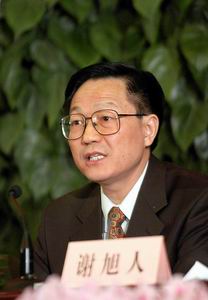
Xie Xuren, director general of the State
Administration
of Taxation, answers questions from the press in
Beijing
yesterday. ¡ª Xinhua
China's taxation administration will speed up reform to levy
unified income tax on domestic and overseas-funded firms, said top tax official
Xie Xuren in Beijing yesterday.
"We have to unify income tax for local
companies and overseas-invested firms to cater to the new situation brought
about by China's entry into the World Trade Organization in 2001 and boost fair
competition among all businesses," said Xie, director general of the State
Administration of Taxation.
China's top legislature, the National People's
Congress, has listed the Law on Enterprises' Income Tax in its lawmaking plan
for 2005.
Npc deputy Cheng Faguang revealed earlier yesterday that China
might unify the income tax rates in 2008.
"This was in my most optimistic
forecast," Cheng, also a member of the NPC Financial and Economic Committee,
told Xinhua on the sidelines of the NPC's annual session.
Xie said his
administration has carried out in-depth research on the unification with other
departments concerned, and would speed up reform of taxation in line with the
legislative procedure.
The actual income tax rate has remained at 14 percent
for overseas-funded businesses, much lower than the 24 percent for domestic
firms, since China formulated the policy for overseas-funded enterprises in
mid-1980s in a bid to lure foreign investment.
Experts and local companies
have complained the policy does not comply with WTO principles and as a kind of
discrimination against domestic firms, it also results in reduction of China's
tax revenues.
The law on Enterprises' Income Tax, which contains a chapter
about the unification of the income tax, has been included in the legislation
plan for 2005.
Cheng pointed out that it caters to "both overseas experience
and domestic situation" to scrap the current dual income tax system.
Cheng
said the policy increases the management cost of taxation administrations and
enterprises and incurs tax dodgery and speculative activities at overseas-funded
firms, he noted.
He played down the impact of unified tax policies on foreign
investment inflow.
Cheng said China should encourage more foreign investment
to flow into new and high-tech and highly value-added industries, as well as
service industries and environmental protection sector to help upgrade its
industrial structure.



